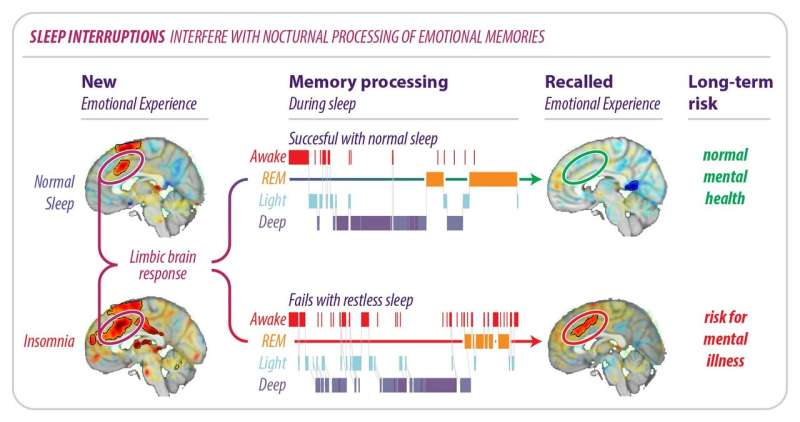Haunted by the past: Insomniacs unable to get emotional distress off their mind

Cringe-worthy mistakes and embarrassing blunders made today won't seem so bad tomorrow. That is, unless you're an insomniac, research at the Netherlands Institute for Neuroscience shows. The scientists asked participants to relive their most shameful experiences of decades ago while making MRI scans of their brain activity. While good sleepers literally settled those experiences in their head as neutralized memories, people with insomnia were not able to do so. This breakthrough finding suggests that insomnia could primarily be caused by a failing neutralization of emotional distress. Which makes it understandable that insomnia is the primary risk factor for the development of disorders of mood, anxiety, and posttraumatic stress. The findings will be published on 25 April in the leading scientific journal Brain.
Maladaptive sleep
It is a well-known fact that sleep helps us to remember important experiences. But sleep is also essential for getting rid of the emotional distress that may have occurred during those experiences. Both these overnight processes involve changes in the connections between brain cells: some become stronger and consolidate memories, whereas others are weakened and get rid of unwanted associations. "Sayings like 'sleeping on it' to 'get things off your mind' reflect our nocturnal digestion of daytime experiences. Brain research now shows that only good sleepers profit from sleep when it comes to shedding emotional tension. The process does not work well in people with insomnia. In fact, their restless nights can even make them feel worse," says first author Rick Wassing.
Karaoke
The new brain imaging findings explain a recent finding that the same research group has just published in the scientific journal Sleep. In this study, they asked participants to sing along karaoke-style. Headphones prevented them from hearing their own voice and finding the correct pitch. Their singing was recorded and played back later. Participants felt intense shame when listening to their own out-of-tune solo singing. But if they listened once more after a good night's sleep, they didn't feel that distressed about it anymore. They had literally gotten the distress off their minds. At least, good sleepers did. After a restless night, people with insomnia were in fact even more upset about it.
Emotion
Scientists have been searching for causes of insomnia in brain areas that regulate sleep. The new findings show that causes of insomnia are probably found in brain circuits that regulate emotions. These circuits contain risk genes for insomnia and may not activate properly, as they normally do, during rapid eye movement sleep. Without the benefits of sound sleep, distressing events of decades ago continue to activate the emotional circuits of the brain as if they are happening right now. Scientists Rick Wassing, Frans Schalkwijk and Eus van Someren thus show that people with insomnia are haunted by memories of past distress.
More information: Brain (2019). DOI: 10.1093/brain/awz089
Rick Wassing et al. Overnight worsening of emotional distress indicates maladaptive sleep in insomnia, Sleep (2019). DOI: 10.1093/sleep/zsz051


















